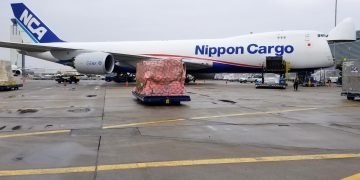By Maria Kalamatas | August 5, 2025
Tokyo, August 5 — The deal had been in the works for over a year. Now it’s done. On the morning of August 1st, ANA Holdings quietly finalized its takeover of Nippon Cargo Airlines, ending months of speculation, delays, and regulatory friction.
“It’s a serious move,” said a senior employee at Haneda Airport who requested anonymity. “This changes how ANA will be seen—not just as a passenger airline, but as a logistics operator with global weight.”
Two fleets, one future
With this acquisition, ANA now owns Nippon Cargo’s full fleet of Boeing 747 freighters. That gives them the muscle to move bulk cargo—auto parts, machinery, even live animals—across continents without relying on commercial passenger flights.
What makes this deal different is not just the hardware. It’s the fact that ANA gains decades of expertise in pure freight handling. Nippon Cargo crews know how to load awkward shipments. They’ve been doing it since the late 1970s.
“They’re not guessing,” said a logistics manager in Narita. “They know every detail of how to move large freight fast—and safely.”
A long wait, not without obstacles
The process dragged. Talks began in 2023, but both the Japanese and Chinese regulators had concerns. In particular, China feared that ANA might dominate certain terminals and squeeze out competition. In the end, conditions were imposed—but the green light came in July.
No press conference. No media blitz. Just a formal notice, a signature, and a quiet change in ownership.
What happens next?
ANA hasn’t said much about its long-term plan. But sources inside the company say a new logistics division is being formed. Nippon Cargo staff will keep their uniforms and jobs for now, but operations will be aligned over the coming months.
On the tarmac, this means more ANA freighters on the Tokyo–Los Angeles route. It may also mean fewer charter flights and more consistent weekly schedules.
For freight customers, that’s a win.
A signal to global shippers
Japan hasn’t always been seen as aggressive in cargo. That may change. This acquisition tells global forwarders and exporters that ANA is serious. Not just about filling space in the belly of a passenger jet—but about offering end-to-end freight services, with its own planes, terminals, and teams.
The market noticed. One German importer who ships auto electronics from Osaka to Frankfurt put it this way: “If ANA can offer guaranteed space with a fixed timetable, we’ll sign tomorrow. We’ve had enough of volatility.”























